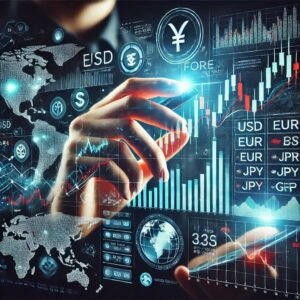
Who Are Forex Traders?
Forex traders are individuals or entities that engage in the buying and selling of currency pairs in the foreign exchange market, with the objective of profiting from fluctuations in exchange rates. This vast market involves various categories of traders, each with distinct motivations and strategies. Among the main types of forex traders are retail traders, institutional traders, and hedgers.
Retail traders are typically individual investors who trade with their own capital. They may utilize online trading platforms and leverage to amplify their potential returns. Unlike institutional traders, retail traders often have limited resources and market insight, relying on technical analysis and market sentiment to guide their decisions. Their trading volume is generally lower compared to institutional counterparts, but collectively, they form a significant part of the forex market.
Institutional traders, on the other hand, are professionals working for large financial organizations, such as banks, hedge funds, and asset management firms. These traders have access to substantial capital, advanced trading tools, and comprehensive market research, which allows them to execute larger trades and influence market movements more significantly than retail traders. Their activities often involve complex strategies tailored to mitigate risks and capitalize on market inefficiencies.
Additionally, hedgers play a crucial role in the forex market. They engage in trading primarily to reduce potential losses from adverse currency movements related to their business operations or investments. This group includes multinational corporations that may engage in foreign exchange trading to lock in exchange rates for future transactions, ultimately stabilizing their costs and revenues.
To be a successful forex trader, a solid understanding of market dynamics, risk management techniques, and analytical skills is essential. Traders often employ various tools, such as charts, indicators, and news sources, to identify potential trading opportunities. By developing a robust trading strategy based on thorough analysis and disciplined risk management, traders can navigate the complexities of the forex market more effectively, contributing to their overall success.
Introducing Market Makers
Market makers play a pivotal role in the foreign exchange (forex) market by ensuring liquidity and facilitating transactions for traders. They are typically large banks or financial institutions that commit to buying and selling currencies at specified prices, thereby creating a continuous flow of trading activity. Their main function is to provide liquidity to the market, which enables transactions to occur with minimal delay and reduces the risk of significant price fluctuations. This provision of liquidity is essential, as it fosters a stable trading environment where market participants can execute their trades without facing excessive bid-ask spreads.
In contrast to other market participants, such as retail traders or speculators, market makers maintain an inventory of currencies, ready to fulfill orders as they arise. This contrasts with brokers, who merely act as intermediaries without holding inventory themselves. Market makers enable smoother trades by absorbing temporary imbalances in supply and demand. Their presence helps reduce price spreads, which refer to the difference between the bid and ask prices. By narrowing these spreads, market makers contribute to the overall affordability and efficiency of the market.
There are various types of market makers, including large banking institutions that operate on a global scale and smaller brokerage firms catering to retail clients. Each type plays a distinct role in the forex ecosystem, impacting market dynamics differently. Larger banks may engage in proprietary trading and offer market making to professional clients, while brokerages might focus on providing services to individual traders. Overall, the contributions of market makers in managing risk, supporting market stability, and ensuring the functionality of the forex market cannot be understated, making them integral players within this financial landscape.
The Relationship Between Forex Traders and Market Makers
The relationship between forex traders and market makers is pivotal in the currency market, as it governs how trades are executed and how prices are determined. Market makers, typically large financial institutions or brokerage firms, facilitate trading by providing liquidity, which ensures that traders can buy or sell currencies without significant delays. They accomplish this by continuously quoting bid and ask prices, allowing traders to engage in transactions quickly.
Forex traders, ranging from individual retail participants to institutional investors, interact with market makers by placing orders that reflect their market expectations. The volume and nature of these orders can significantly influence the pricing dynamics in the market. For example, when a large number of traders are buying a particular currency pair, the heightened demand may prompt market makers to increase the ask price to reflect the greater willingness of traders to pay. Conversely, if more traders are selling, the bid price may be adjusted downwards. This interplay between supply and demand is essential in setting the prevailing market prices.
The concept of order flow also plays a critical role in this relationship. Market makers analyze trading volume and can use this information to anticipate future market movements. A surge in trading activity can lead market makers to adjust their prices, which impacts liquidity. For individual traders, understanding this relationship is crucial, as it can provide insights into market conditions and potential price movements. Larger financial institutions, on the other hand, have the capacity to wield more influence over market makers. By executing sizeable trades or implementing complex strategies, they can directly affect liquidity and influence prices, further highlighting the intricate web of connections between these key players in the forex market.
Challenges and Opportunities in Forex Trading and Market Making
The forex market presents a unique set of challenges for both traders and market makers, primarily due to its inherent volatility. Currency values can fluctuate significantly based on numerous factors, including geopolitical events, economic data releases, and changes in interest rates. This unpredictability can create stressful environments for forex traders, impacting their decision-making processes and strategies. Market makers, tasked with providing liquidity, must also navigate this volatility, which can affect their pricing models and the spread they offer to clients.
Regulatory changes further complicate the landscape for both parties. Forex trading operates in a highly regulated environment, with different countries imposing various rules on trading practices and market operations. Staying abreast of these modifications is essential, as non-compliance can lead to severe penalties or loss of trading privileges. For market makers, adhering to these regulations while maintaining competitive pricing and service quality can be a daunting task.
Despite these challenges, numerous opportunities exist within the forex market. The technological advances in trading platforms and algorithms have created new avenues for forex traders to refine their strategies and enhance their trading efficiency. Automated trading systems, for example, allow for the execution of trades based on predefined criteria, removing emotional biases and increasing the potential for profit. Additionally, market makers can leverage technology to improve their liquidity provisioning, offering tighter spreads and better trade execution.
Aspiring forex traders and market makers should recognize the importance of adaptability and continuous learning. As market dynamics change, seizing opportunities necessitates an ongoing commitment to education and skill enhancement. By embracing technology and remaining informed on market trends and regulations, individuals can position themselves to thrive in the evolving landscape of forex trading and market making.

